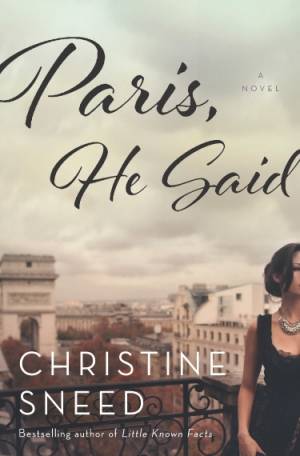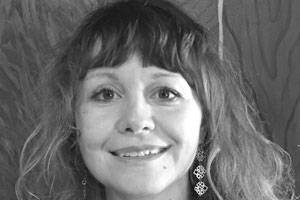Evanston-based author Christine Sneed is a critically acclaimed short story writer and novelist whose writing often visits the uncomfortable intersections of social status, ambition, and sexuality in romantic relationships. Her new novel, Paris, He Said, addresses these themes again through the story of Jayne, a young artist who accepts her wealthy older lover’s offer of financial support and a life in Paris. Upon arriving in the City of Light, Jayne finds boyfriend Laurent to be less than reassuring on the subject of exclusivity and her new life to be more complicated than she had imagined.
Sneed was the winner of both the Grace Paley Award for Short Fiction and the Ploughshares John C. Zacharis Award for her debut collection of short stories, Portraits of a Few of the People I’ve Made Cry, and has received many other honors during her career. She teaches creative writing at both Northwestern and U of I and will be reading from her work during the Pygmalion LitFest.
 Smile Politely: Paris, He Said starts with what seems like a very familiar set-up of a young woman getting into a relationship with a wealthy older man who quickly arouses the reader’s suspicions. You then take that scenario in some possibly unexpected directions. Were you intentionally playing with audience expectations?
Smile Politely: Paris, He Said starts with what seems like a very familiar set-up of a young woman getting into a relationship with a wealthy older man who quickly arouses the reader’s suspicions. You then take that scenario in some possibly unexpected directions. Were you intentionally playing with audience expectations?
Christine Sneed: As I wrote, I wasn’t conscious of a desire to play with readers’ expectations, but I’ve written about May-December romances in other fiction and I find the dramatic possibilities in the age and socioeconomic differences between the characters, as well as the power dynamic in the couple, very interesting to consider. I guess, in a sense, I did hope to defy readers’ expectations of a predictable conclusion (though I’m not sure what it would be — a happy ending, or a tragic one?), though I wasn’t directly aiming for this as I wrote.
SP: The book has an interesting structure, with Laurent taking over as narrator over halfway through and then Jayne narrating the final section. Why did you feel it was important to include Laurent’s perspective?
Sneed: I think it would be easy for many readers to dismiss him as a cad and an unapologetic womanizer if his point of view wasn’t represented in the novel. Allowing him to have his own say, I hoped, would add depth and nuance to his character and more complexity to the things he does throughout the novel.
SP: Paris is almost a character in and of itself in Paris, He Said. What inspired you to set the story there, and did you get to do any in-person research?
Sneed: I did go to Paris twice to do research while I was writing this novel. I was a French major in college and lived in France during my junior year and also visited Paris several times during those nine months (I studied in Strasbourg). In Paris, He Said, I wanted to try to understand my feelings about the city and the differences that I’ve perceived in French and American culture.
SP: A lot of your characters are either highly creative themselves (painters, sculptors, screenwriters, actors) or drawn to people who are. What makes writing about artists so appealing for you?
Sneed: Artists and their uncertainties about their talent, the economic and emotional challenges of a life in the arts – these topics interest me very much. The creative path is similar for writers, and having worked at the School of the Art Institute of Chicago for five years, I met and became friends with several artists, and similar to my answer above, I hoped to write with insight about some of the choices and personal sacrifices many artists and writers must make.
SP: You’re a former co-curator of the Sunday Salon Chicago series of monthly author readings. From your experiences there, what do you think readers gain by hearing an author perform their work rather than just experiencing it via the page?
Sneed: Live lit performances are one way for readers to be active participants in the literary community, and potentially to be inspired to write too, if that’s what they hope to do. It’s also often interesting and transformative, perhaps, to hear the writers’ work in their own voices. I usually go home from a reading where I’ve been in the audience rather than on the stage feeling inspired to read more and to write more too. Anything that gets people away from their televisions and smartphones for a few hours!
Distract yourself from distraction by paying full attention to Christine Sneed’s reading, taking place at Cafeteria & Co at 7 p.m, on Thursday, September 24th, with Michael Czyzniejewski and Ladan Osman following, and no cover charge.








